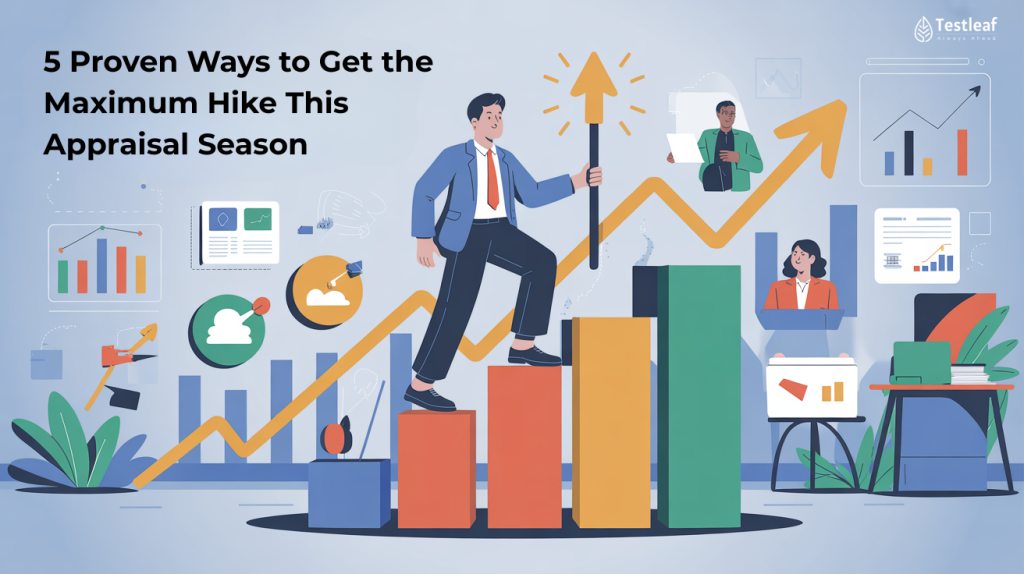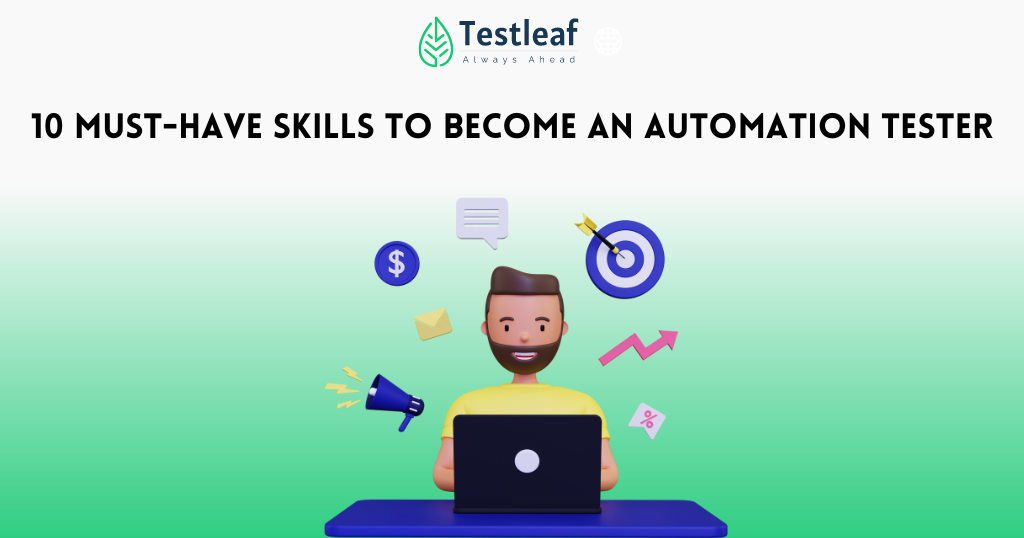Appraisal season is here again — the time when every software tester reflects on their performance, updates achievements, and prepares to justify that much-deserved salary hike. But in 2026, traditional performance parameters aren’t enough. With automation, AI, and DevOps transforming QA, the question isn’t just how well you tested, but how fast you adapted.
Whether you’re a manual tester or an automation expert, staying relevant means constantly upgrading your tech stack. Let’s explore five proven ways that can help you stand out in your next appraisal and unlock a bigger salary hike.
1. Evolve from Manual to Automation — Your First Step Toward a Bigger Paycheck
If you’re still testing manually, this is your moment to level up. Manual testing will always have its place, but automation has become the backbone of modern QA. Learning automation not only boosts your productivity but also positions you as a valuable asset who can handle large-scale regression and performance testing.
Start with Selenium automation testing, one of the most in-demand tools across QA teams worldwide. Selenium offers flexibility, integrates easily with CI/CD pipelines, and supports multiple languages like Java, Python, and C#. Once you master Selenium, you’ll be able to write, execute, and maintain automated test scripts for complex projects—making your contribution more measurable and impactful.
💡 Pro Tip: Show your initiative by highlighting automation coverage, reduced test cycle times, and improved release quality in your performance sheet.
Continue Reading: selenium interview questions
2. Learn AI in Software Testing — The Smartest Investment for 2026
AI is no longer a futuristic buzzword—it’s already reshaping the testing industry. Tools and frameworks powered by AI in software testing can predict potential defects, auto-generate test cases, and analyze test coverage more efficiently than ever before.
If you’re an automation tester, learning AI will instantly put you ahead of your peers. Imagine being the engineer who introduces AI-driven test prioritization, predictive analytics, or self-healing scripts to your project. That’s not just skill — that’s innovation.
You can start by exploring AI-assisted test tools or courses that teach how AI integrates with Selenium, Playwright, and API testing frameworks. This hybrid skillset will make you the kind of tester companies can’t afford to lose.
💡 Pro Tip: Mention AI-driven improvements—like reduced test maintenance or early bug detection—in your appraisal to show quantifiable innovation.
3. Expand Your Automation Toolbox — Don’t Just Stop at Selenium
Knowing one automation tool is good. Knowing many is power. In today’s fast-changing testing landscape, expanding beyond Selenium makes you adaptable and future-proof.
If you already know Selenium, it’s time to explore Playwright or Cypress. Both are modern, developer-friendly frameworks that support faster, more stable browser automation.
A Playwright course online can help you master parallel execution, cross-browser testing, and API validations—all while writing clean, maintainable code. Similarly, Cypress offers robust testing capabilities for frontend-heavy applications. Learning these tools proves your ability to adapt quickly and work across different tech stacks—a key quality that every appraiser values.
💡 Pro Tip: Show how you’ve diversified your skillset with multiple tools—emphasize that you can choose the right framework for each project.
Check Out These Articles: api testing interview questions
4. Get Familiar with DevOps — Bridge the Gap Between Testing and Deployment
Today’s testing teams don’t work in isolation. Continuous Integration and Continuous Deployment (CI/CD) have become the new normal, and testers who understand DevOps pipelines are indispensable.
By learning DevOps fundamentals, you can automate test runs in Jenkins, monitor build quality, and collaborate better with developers and operations teams. Enrolling in online courses for DevOps will teach you practical skills like containerization with Docker, orchestration with Kubernetes, and pipeline automation—boosting both your technical profile and salary potential.
💡 Pro Tip: Add a “DevOps integration” section to your performance goals. Mention how your automation scripts now trigger in CI/CD, saving time and ensuring faster feedback loops.
5. Learn Cloud Skills — AWS Is the Game Changer
As more companies migrate their applications to the cloud, QA engineers with cloud knowledge are becoming invaluable. Learning cloud testing and deployment concepts—especially through AWS courses online—can dramatically strengthen your resume.
With AWS, you can perform scalable test executions, manage test environments on-demand, and integrate automation tools directly into cloud infrastructure. Cloud-savvy testers can reduce costs, optimize performance, and ensure their projects run efficiently across multiple environments.
💡 Pro Tip: Demonstrate how your cloud knowledge improved test efficiency or helped scale test environments — a strong metric to justify your appraisal hike.
Final Thoughts — Your Growth Is in Your Hands
In 2026, software testing is not just about finding bugs — it’s about building quality faster and smarter. Companies reward testers who evolve with technology and bring innovation to their roles.
To summarize:
· Manual testers must learn automation and AI to stay relevant.
· Automation testers must embrace AI-driven tools and expand to frameworks like Playwright or Cypress.
· Every tester should understand DevOps workflows and cloud fundamentals for end-to-end visibility.
By upgrading your skills in Selenium automation testing, AI in software testing, Playwright course online, online courses for DevOps, and AWS courses online, you’ll not only secure a higher appraisal but also position yourself as a future-ready QA professional.
Remember: The biggest hike doesn’t come from working harder — it comes from working smarter. This appraisal season, invest in learning, and let your upgraded skills speak louder than your appraisal sheet.
FAQs
1. How can a manual tester get a better appraisal hike?
By learning automation tools like Selenium and expanding into AI-driven testing, manual testers can increase productivity and prove higher business impact.
2. What are the most in-demand tools for software testers in 2026?
Top tools include Selenium, Playwright, Cypress, and AI-enabled platforms such as Testim, Mabl, and Testron.ai.
3. Why should testers learn AI in software testing?
AI helps automate test creation, defect prediction, and maintenance, allowing testers to focus on strategy rather than repetitive tasks.
4. How does DevOps knowledge help in testing?
Understanding DevOps enables testers to integrate automation into CI/CD pipelines, ensuring faster releases and continuous feedback.
5. What cloud skills should QA professionals learn?
AWS is a must-have. It supports scalable test environments, cost optimization, and seamless integration with automation frameworks.
We Also Provide Training In:
- Advanced Selenium Training
- Playwright Training
- Gen AI Training
- AWS Training
- REST API Training
- Full Stack Training
- Appium Training
- DevOps Training
- JMeter Performance Training
Author’s Bio:

Content Writer at Testleaf, specializing in SEO-driven content for test automation, software development, and cybersecurity. I turn complex technical topics into clear, engaging stories that educate, inspire, and drive digital transformation.
Ezhirkadhir Raja
Content Writer – Testleaf








